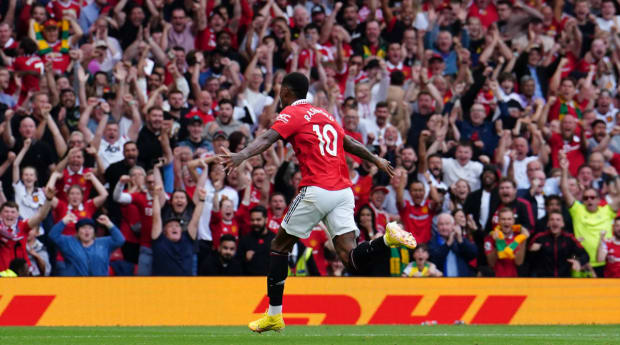After Sunday’s 3–1 loss to Manchester United, Arsenal can console itself with the thought that the performance was largely good and that it remains top of the Premier League, but for Mikel Arteta’s side, this was a first defeat of the season and—perhaps more worryingly—a sixth defeat in its last seven away games against other members of the Big Six.
A fourth straight win for Manchester United, meanwhile, has lifted it to fifth, just three points behind Arsenal and, more significantly, indicated there is a spirit and resolve about the side that seemed wholly lacking just four weeks ago.
Suddenly everything is going right for Erik ten Hag. That 4-0 defeat at Brentford in the second game of the season may come to be seen as the moment United hit the bottom before the ascent. ten Hag’s selection at home to Liverpool, leaving out Harry Maguire and Cristiano Ronaldo, was bold, but it worked perfectly. Although United won that game only 2–1, it was far more dominant than that, and the nature of the performance was such a gamble that it could have made ten Hag a laughing stock—imagine the furor had United lost having dropped its captain and its highest-paid player. Successive 1-0 wins over Southampton and Leicester furthered steadied the ship. Maguire and Ronaldo were both on the bench again.
But perhaps just as significant in lending ten Hag authority is the way United has backed him in the transfer market. The €100 million ($99.5 million) fee for Antony looks extremely high—is extremely high for a 22-year-old of limited experience, no matter his potential—but that fact the club was prepared to pay so much to prise him from Ajax suggests its faith in ten Hag and its willingness to back him.
Antony began the process of repaying that faith by scoring 35 minutes into his debut with a neat left-foot finish shaped into the far post. Just as significant, though, was the nature of the move: a good advantage played by the referee, Paul Tierney, before the game opened up by Christian Eriksen’s swift forward pass to Bruno Fernandes. The final pass from Marcus Rashford to Antony was then perfectly weighted.
Arsenal had arguably been the better side up to that point and had a goal ruled out following a VAR review of a challenge by Martin Ødegaard on Eriksen. The goal, though, exposed defensive issues, with Gabriel seemingly caught unaware, Oleksandr Zinchenko failing to track and Aaron Ramsdale committing too early so the finish was relatively straightforward.
One of the great strengths of Arteta’s side this season has been its resilience. It had conceded four times in the first five games of the season and on each occasion had scored within eight minutes. There was no such immediate bounce-back here, but Arsenal remained the better side in the early period of the second half and had already had a couple of decent chances when Bukayo Saka leveled on the hour, sweeping the ball home after Ødegaard’s through ball had been deflected into his path, the move initiated as Fernandes’s pass was intercepted.
But the same weakness that had undone Arsenal in the first half soon undid it again. A turnover deep in United’s own half, a rapid forward pass from Eriksen and a ball from Fernandes to Rashford and United was through again. This time, Rashford took on the opportunity himself and scored with the help of a slight deflection that lifted the ball over the legs of Ramsdale. He added a third with 14 minutes remaining, knocking in Eriksen’s square pass after Arsenal was caught extremely high, a flurry of substitutions having seemingly disrupted its shape.

IMAGO/PA Images
In a sense, this was United returning to the basics that had characterized its play when things went right under Ole Gunnar Solskjær. It is a team set up to counterattack, and it was the mobility of the forward line necessary for that setup that was so disrupted by the signing of Ronaldo. All three goals were about transitions, Eriksen playing a key role in all three.
For Arsenal, it is perhaps time for a dose of realism. It played very well in its first five games of the season, but each was against a team it would expect to beat. There was plenty to admire here as well, but a couple of slight defensive questions that had emerged in the first month of the season were further exposed and, possibly more troublingly, it lost a game it was dominating largely because of naivety.







